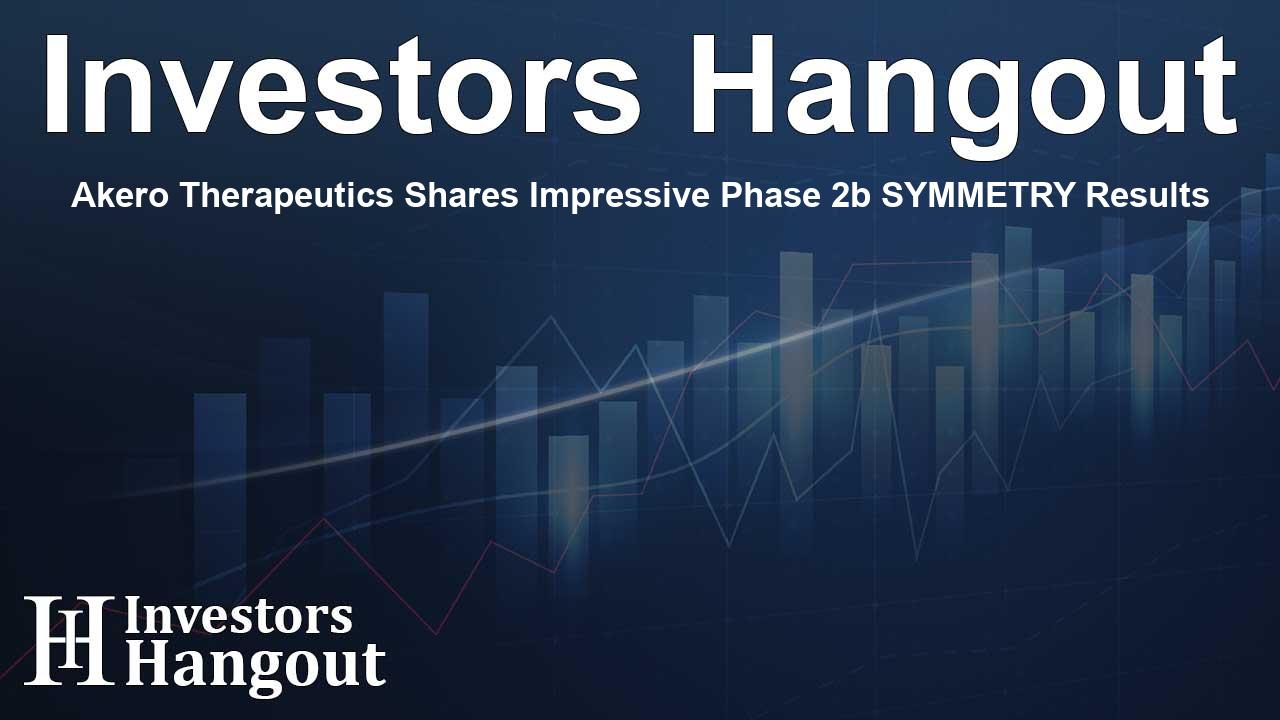Akero Therapeutics Shares Impressive Phase 2b SYMMETRY Results

Akero Therapeutics Reveals Groundbreaking Study Findings
Akero Therapeutics, Inc. (Nasdaq: AKRO), a committed clinical-stage company focused on developing innovative treatments for metabolic diseases, has made waves within the medical community. They recently revealed impressive results from their Phase 2b SYMMETRY trial, highlighting efruxifermin (EFX) as a promising treatment for patients suffering from compensated cirrhosis caused by metabolic dysfunction-associated steatohepatitis (MASH).
Transformational Results from the SYMMETRY Trial
The findings from the SYMMETRY trial, which were presented during the European Association for the Study of the Liver (EASL) Congress 2025, showcased how EFX could significantly improve fibrosis in patients with compensated cirrhosis. With a focus on clinical relevance, Kitty Yale, Akero's chief development officer, emphasized that the outcomes from this study set EFX apart from other treatments by demonstrating its ability to reverse fibrosis rather than simply manage symptoms.
High Unmet Medical Need
Cirrhosis related to MASH continues to be a dire health concern, with patients facing extremely limited treatment options and a heightened risk of severe outcomes, including liver failure. Dr. Mazen Noureddin, principal investigator of the SYMMETRY trial, noted that without intervention, patients may have a 50% risk of mortality within five years. EFX's ability to show anti-fibrotic activity offers a beacon of hope in this grim landscape.
Analyzing the Data: Insights into Fibrosis Improvement
The Week 96 data demonstrated a marked reduction in fibrosis for patients receiving EFX, compared to those given placebo. Specifically, 39% of participants treated with EFX 50mg exhibited fibrosis improvement based on biopsy analysis, significantly higher than the 15% observed in the placebo cohort. This reflects a compelling statistical trend that could reshape treatment protocols for cirrhosis.
Comprehensive Analysis and Key Findings
The study employed rigorous criteria, assessing both completer and intent-to-treat (ITT) populations with impressive results. Notably, while the primary endpoint at Week 36 showed promise, it was the continued evaluation up to Week 96 that revealed robustness in the treatment's efficacy. These findings underline the necessity of prolonged treatment for an effective response in patients with advanced fibrosis.
Safety Profile and Well-Being of Patients
Throughout the SYMMETRY trial, the safety and tolerability of EFX remained consistent. Gastrointestinal related side effects, such as mild diarrhea and nausea, were the most frequently reported adverse events. However, these symptoms were primarily transient and did not deter the overall positive response to treatment.
Future of Efruxifermin: Beyond Current Trials
The promising landscape for EFX does not stop here. Akero is committed to further exploring the therapeutic benefits of Efruxifermin through ongoing Phase 3 studies. These trials will potentially expand on SYMMETRY's findings and explore the treatment's long-term effects across diverse patient populations.
Broader Impacts of MASH
The urgency of addressing cirrhosis due to MASH cannot be overstated. As this condition is projected to surge, affecting millions in the coming years, developments like those from Akero put forth mechanisms not only for treating liver fibrosis but also for transforming the trajectory of liver health in a population at risk. With an emphasis on prevention and early intervention, EFX stands poised to change the narrative.
Frequently Asked Questions
What is the primary outcome measure of the SYMMETRY study?
The primary outcome measure was the proportion of patients achieving ?1 stage fibrosis improvement without worsening of MASH at Week 36.
How well was EFX tolerated by participants?
EFX was found to be well-tolerated, with mild side effects primarily related to gastrointestinal issues.
How does EFX compare to placebo in terms of efficacy?
Compared to placebo, EFX demonstrated significantly improved fibrosis reduction among treated patients at both Week 36 and Week 96.
Has EFX been evaluated in other stages of MASH?
Yes, EFX is currently being investigated in multiple Phase 3 studies targeting different stages of MASH.
What are the next steps for Akero Therapeutics?
Akero will continue to evaluate EFX in ongoing Phase 3 studies, with a focus on refining treatment for patients with metabolic disorders.
About The Author
Contact Dominic Sanders privately here. Or send an email with ATTN: Dominic Sanders as the subject to contact@investorshangout.com.
About Investors Hangout
Investors Hangout is a leading online stock forum for financial discussion and learning, offering a wide range of free tools and resources. It draws in traders of all levels, who exchange market knowledge, investigate trading tactics, and keep an eye on industry developments in real time. Featuring financial articles, stock message boards, quotes, charts, company profiles, and live news updates. Through cooperative learning and a wealth of informational resources, it helps users from novices creating their first portfolios to experts honing their techniques. Join Investors Hangout today: https://investorshangout.com/
The content of this article is based on factual, publicly available information and does not represent legal, financial, or investment advice. Investors Hangout does not offer financial advice, and the author is not a licensed financial advisor. Consult a qualified advisor before making any financial or investment decisions based on this article. This article should not be considered advice to purchase, sell, or hold any securities or other investments. If any of the material provided here is inaccurate, please contact us for corrections.
